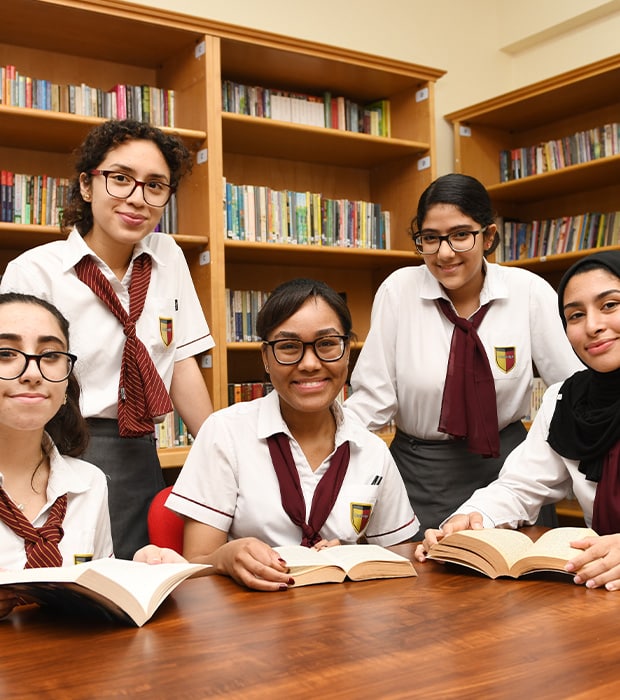If you have recently moved or are planning to move to Abu Dhabi from the UK, Ireland, or elsewhere, this guide is for you. It will help you understand the education system in the United Arab Emirates and decide on the best schools in Abu Dhabi for your children.
Public and Private Education
The UAE has both public and private schools. Public schools in Abu Dhabi are open to the public, with some exceptions described below, and do not charge for tuition. Private schools in Abu Dhabi are fee-paying schools.

UAE public schools are state-funded or government schools broadly equivalent to UK state schools. They are free to attend but only for citizens of the UAE and the member-nations of the Gulf Cooperation Council (GCC): Bahrain, the Kingdom of Saudi Arabia, Kuwait, Oman, and Qatar. UAE passport holders (e.g., UAE dual citizens) and children of those who have acquired UAE citizenship by decree may also attend UAE public schools for free.
UAE private schools are the equivalent of UK independent schools. They are fee-paying schools, so parents pay for tuition and other costs.
Public or Private School?
Expats in the UAE typically enrol their children in private schools. Government/public schools accept expatriates, but they teach in Arabic and not in English. Government schools are fee-paying for non-Emiratis and non-GCC citizens.
Regulatory Authorities in the UAE
The Ministry of Education (MoE) is the federal government agency responsible for education regulation in the UAE. However, Dubai, Abu Dhabi and Sharjah have emirate-level education regulatory authorities. They are:
- The Abu Dhabi Department of Education and Knowledge (ADEK)
- The Knowledge and Human Development Authority (KHDA) for Dubai
- Sharjah Private Education Authority (SPEA)
ADEK regulates both public and private schools in Abu Dhabi, while the KHDA and SPEA supervise private education only in Dubai and Sharjah respectively. Meanwhile, the MoE remains the primary education regulation authority in the emirates of Umm Al Quwain, Ras Al Khaimah, Ajman, and Fujairah.
Curriculum Options
Private schools in Abu Dhabi are free to set their curriculum. They may:
- Stick to a single curriculum from the early years stage until post-16
- Implement multiple curricula concurrently
- Offer multiple curriculum streams
In Abu Dhabi, there are currently 14 curriculum options.
- American curriculum
- Bangladeshi curriculum
- British curriculum
- Canadian curriculum
- French curriculum
- German curriculum
- IB curriculum
- Indian curriculum
- Japanese curriculum
- Pakistani curriculum
- Philippine curriculum
- SABIS curriculum
- Spanish curriculum
- MoE curriculum for the UAE
The 4 Major Curriculum Options in Abu Dhabi
The following are the curricula most commonly used by the private international schools in Abu Dhabi.
American Curriculum
The American curriculum is taught in English and typically follows a school-specific mixture of standards. These often include the U.S. Common Core State Standards, Next Generation Science Standards (NGSS), and the standards of a specific U.S. state chosen by the school (e.g., California State Standards or Connecticut Core Standards).
In American curriculum schools, you can enrol your children in pre-kindergarten when they turn three, proceeding to kindergarten 1 (KG1) at age four and kindergarten 2 (KG2) at age five. When they’re six, they can enrol in first grade. There are 12 grades in the American curriculum: grade 1 (age 6-7) to grade 12 (age 17-18).
The American curriculum does not require board exams. However, grades 3-9 students in Abu Dhabi are likely to take the computerised adaptive Measure of Academic Progress (MAP) tests in maths, English and science from the Northwest Evaluation Association (NWEA). American curriculum students in Abu Dhabi may also take the SAT, the ACT and advanced placement (AP) assessments for university admission.
Aside: You can learn more about the suitable age for each grade using this age grade placement guide. In the UAE, compulsory education begins at age six, so pre-K, kindergarten, nursery, and infant school are voluntary. That said, early education is popular with both Abu Dhabi educators and expat parents.
British Curriculum
The British curriculum schools in Abu Dhabi follow the National Curriculum for England. In the United Kingdom, the curriculum has the following stages: Early Years Foundation Stage, Key Stages 1-4, and Sixth Form. In Abu Dhabi, it has the follows the same structure:
- The Early Years Foundation stage (EYFS): nursery or foundation stage 1 (FS1) for children aged three and reception or FS2 for children four years old
- Key Stages 1-4: year 1 (starts at age five) to year 11 (starts at age 15); corresponds to the American curriculum’s grade 1-10
- Key Stage 5 or post-16: Years 12-13 (for 16 to 18-year-olds)
Children on the British curriculum get an EYFS profile during the reception stage. They go through teacher-administered phonics screening in Year 1 and take more formal assessments in English and maths during Years 2 and 6. Pupils then sit for their General Certificate of Secondary Education (GCSE) exams in Year 11 and Advanced Level (A-Level) exams in Year 13.
Indian Curriculum
The Indian curriculum can follow the syllabi and standards of a specific board of education in India. In Abu Dhabi, Indian curriculum schools follow either the Central Board of Secondary Education (CBSE) or the Kerala State Education Board (KSEB).
There are typically six stages to the Indian curriculum:
- Pre-kindergarten: playgroup at age two and nursery at age three
- Kindergarten: lower KG at age four and upper KG at age five
- Lower primary: Grades 1-4, begins at age six
- Upper primary: Grades 5-7, begins at age 10
- High school: Grades 8-10, begins at age 13
- Higher secondary: Grades 11-12, begins at age 16
Indian school students are mainly assessed internally. However, they must sit and pass board-administered exams in Grades 10 and 12 (possibly Grade 11, too) to earn their secondary school and higher secondary certificates.
International Baccalaureate (IB) Curriculum
The IB curriculum is a globally recognised curriculum framework that can work concurrently with a different, standards-based curriculum like those discussed above. The IB can be divided into three stages:
- Primary Years Programme (PYP): includes KG1 at four and KG2 at five as well as Grades 1-5
- Middle Years Programme (MYP): encompasses Grades 6 (starts at age 11) up to Grade 10 (starts at age 15)
- Diploma Programme (DP): Grade 11 (age 16-17) and 12 (age 17-18)
There are UAE schools authorised to offer the career-focused Career Programme in lieu of the Diploma Programme. Every phase comes with mandatory projects (e.g., the mandatory exhibition in PYP and the personal project in MYP).
Abu Dhabi Education for Expat Parents
Moving to Abu Dhabi? Many private schools teach in English, and you’ll find they offer a variety of excellent learning environments. A good choice of curriculums will be available to you.
In summary, while the MoE is the federal regulator for education, ADEK is the emirate-level education regulation authority in Abu Dhabi, and it recognises 14 curriculum options. The most popular among private international schools are the American, British, Indian, and International Baccalaureate curricula.




